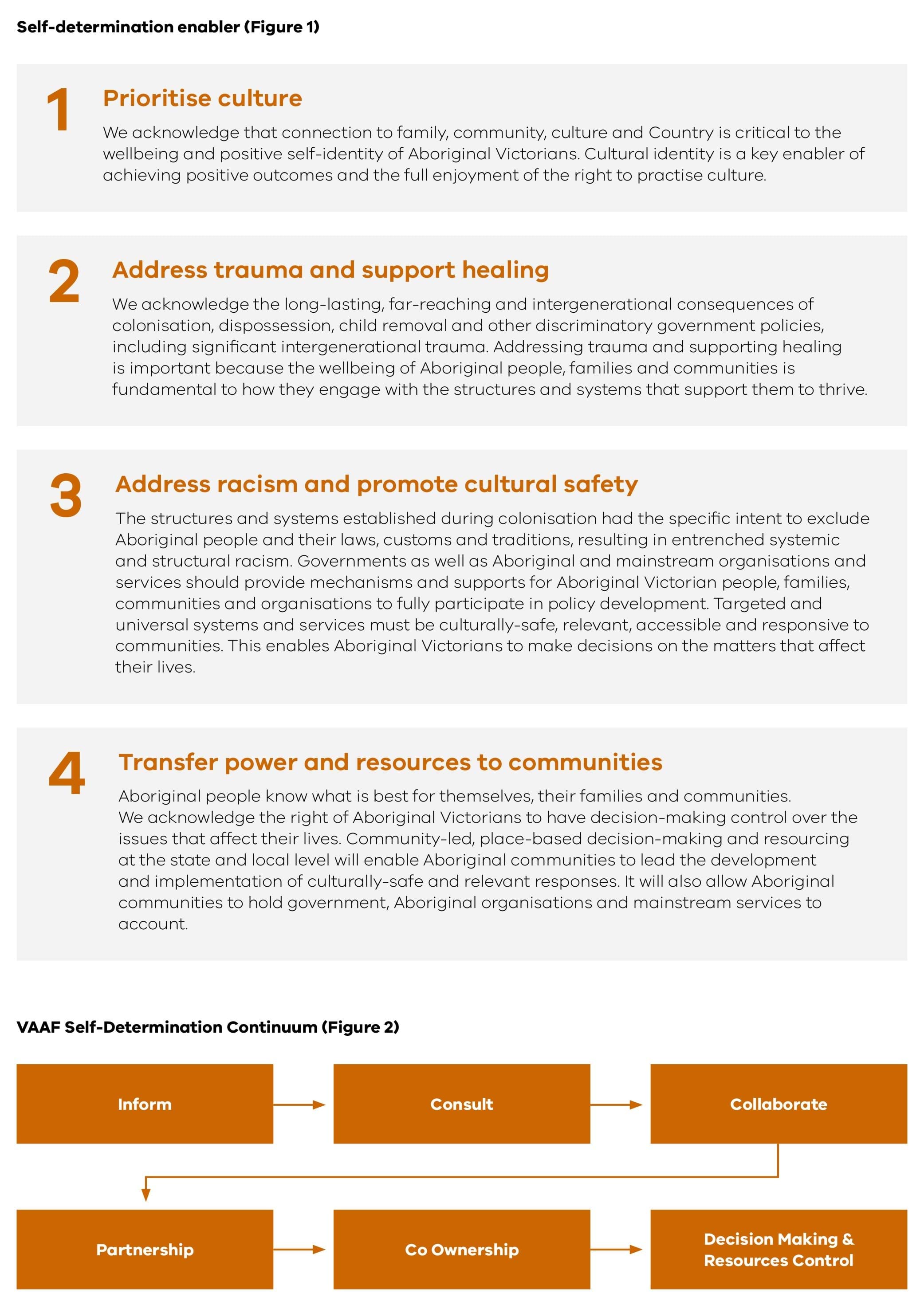Self-determination is key to improved outcomes for First Peoples. It is a human right enshrined in the United Nations Declaration on the Rights of Indigenous Peoples and is a guiding principle under the Advancing the Treaty Process with Aboriginal Victorians Act 2018. The SDRF was developed in 2019 to embed government’s commitment to self-determination across all areas of government, and to help fulfill the ambitious and forward-looking agenda of the VAAF.
All government departments and agencies are required to report annually on what they are doing to action the VAAF’s four self-determination enablers (Figure 1).
Annual reporting aims to measure where on the VAAF self-determination continuum (Figure 2) our actions are landing and invoke reflection on how to move further along that spectrum. Departments demonstrated good progress towards supporting self-determination in 2023, including through identifying and removing barriers that keep First Peoples from exercising their right to self-determination.
Government action under the four self-determination enablers
Prioritise culture
The heritage of First Peoples is particularly significant because it represents the oldest continuing cultures in the world. Recognising and celebrating First Peoples’ culture strengthens and enriches the identity of all Victorians. Prioritising culture is also key to creating culturally safe workplaces, policies, programs and services. The Domain chapters of this Report include some examples of how departments demonstrated a commitment to making culture a priority in policy, program and service delivery in 2023.
Treaty also presents an opportunity to further recognise and celebrate the unique status, rights, cultures and histories of First Peoples. In negotiating Treaty with First Peoples, the Victorian Government is acknowledging that prior to the formation of the State of Victoria, First Peoples communities were here – practicing their own law, lore, and cultural authority.
Address racism and promote cultural safety
To advance self-determination, government must ensure that its systems and funded services are culturally safe, relevant, accessible and responsive. Government must also act to overcome racism, unconscious bias and discrimination in government laws, policy, practice, systems and institutions. Systemic racism and unconscious bias are primary contributors to social and economic disadvantage, such as the over-representation of Aboriginal Victorians in the criminal justice and child protection systems.
Government organisations have gone some way in transforming services to being culturally safe and responsive. Rolling out cultural awareness training, engaging in collaborative partnerships and workforce development initiatives contribute to creating a culturally safe environment. However, government organisations must move beyond small-scale, individual actions, and prioritise system-level changes to policies and practices. Developing and executing whole-of-organisation transformation strategies are necessary to ensure that government organisations are cultural safe and responsive to Aboriginal people, including through the services government funds.
Address trauma and support healing
Supporting healing is fundamental to the wellbeing of Aboriginal people, families and communities. This begins with acknowledging past and ongoing trauma caused by colonisation, disruption of culture, dispossession of land, forced child removal and other discriminatory policies. Central to this is government’s genuine and transparent engagement with the truth-telling process of the Yoorrook Justice Commission. The Commission operates independently from government and is First Peoples-led. The Commission has an unprecedented and broad mandate to hear, record and make recommendations to address the truth of First Peoples’ experiences of colonisation in Victoria from 1788 to the present. Its objectives include:
- establishing a public record based on First Peoples’ experiences of systemic injustices,
- developing a shared understanding among all Victorians of the individual and collective impact of systemic injustices, and
- determining the causes and consequences of systemic injustices, including the role of the State’s laws and policies.
In this truth-telling process, the Government has responded to information and document requests, provided submissions, and given evidence to support the Commission’s lines of inquiry. The Victorian Government is committed to acknowledging the truth of Victoria’s history and laying the foundations for improved relationships between the State, Aboriginal Victorians and the broader Victorian community. Truth-telling provides an opportunity to develop a shared understanding of the contemporary injustices that persist and to guide the reforms needed to address them, including through Treaty. The Yoorrook Justice Commission will run until 30 June 2025 after being granted a 12-month extension.
Government must continue to reform discriminatory laws, embed trauma-informed policies and programs, and develop new relationships of trust with Aboriginal communities.
Transfer power and resources to communities
Self-determination means that the State supports First Peoples to exercise control over their own lives. This requires a transfer of decision-making power and resources to First Peoples. Progress on this has been limited so far. Examples include: providing funding to Traditional Owner Corporations, progressing agreements with Traditional Owners, and transferring resources to ACCOs to support service delivery.
Treaty provides a path to negotiate the transfer of power and resources and realise self-determination. As detailed under Domain 6 of this Report, the Treaty process has achieved significant milestones in 2023. Victoria is preparing to embark on the next phase of the landmark Treaty process and commence formal Treaty negotiations in 2024.
Specific examples of government actions to enable self-determination reform can be found under the relevant VAAF domain in this Report.
Case studies and actions from departmental SDRF reports are spread throughout Domain chapters of the VGAAR
Updated


